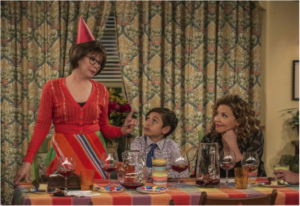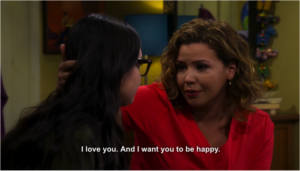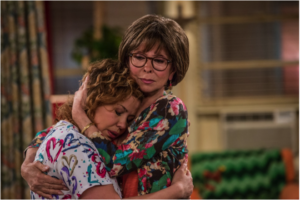By Sophia Simon-Bashall
I am not someone who watches a lot of TV programmes.
I’ve watched and enjoyed a couple of shows in the past year or so, but I am still more of a movie fan. Nothing, except Orange Is The New Black, has really excited me. Until very, very recently.
At the beginning of 2017, Netflix premiered a new show called One Day At a Time. It’s a remake of a 1975 American sitcom. It could’ve fallen into the trap of nostalgia. It could’ve tried to replicate the original. But it didn’t. It is entirely its own show – merely paying homage to the former incarnation – and it is absolutely brilliant.
You should watch it. Here are ten reasons why:
1. One Day At a Time is centered around one Cuban-American family, all of whom are proud of their heritage. Too often, Latinx representation on screen is marginal, caricatured, and negative. That is not the case here. Where stereotypes are used, they are acknowledged – and either celebrated or gently mocked. In this show the Latinx characters are allowed complexities and contradictions – they are multi-dimensional. They are flawed human beings who are ultimately good and moral. This kind of representation is so important, but especially in the current state of the world.
2. At its core, the show is light-hearted and fun. It is a wonderful relief, and it is impossible not to laugh from your belly whilst watching it.

3. But it is also unafraid to tackle important issues, and is not neutral in its viewpoint. Across the first series, One Day At a Time talks about refugees and has a key storyline focused on deportation. It touches on these topics with sensitivity and compassion, refusing to perpetuate the dehumanisation and demonization of migrants and asylum seekers.
4. The teenage girl in the family, Elena, takes ‘social justice warrior’ as a compliment, and is unapologetic about her beliefs.
5. And *SPOILER ALERT*
Her coming out is so well done. Coming out is usually depicted as a single moment in time, and it typically has one of two outcomes: either everybody is fine with it (YAY!) or the reaction is extremely negative. This is rarely a reflection of reality. For most of us, coming out is a more continuous process, and that is exactly what One Day At a Time Elena comes out to different people in her life at different points, and each of them have different reactions. She faces several difficulties – most significantly when she tries to come out to her father – but it is ultimately a positive experience. This is encouraging for closeted LGBTQ+ people – far more so than the overwhelmingly positive depictions of coming out, which only cisgender heterosexual folk believe in. What Elena’s journey shows is the truth:
coming out isn’t all rainbows and unicorns, but it isn’t always tragic and traumatic either.

6. Penelope – the mom – is a veteran who served in Afghanistan, and defies the notion that women cannot be strong and brave and badass. This comes out in so many instances throughout the series, and it is a delight to watch.
7. But she is also allowed to be vulnerable, too. She struggles with PTSD as a result of her time in action, and we witness some of her difficulties with this. What’s heartening is that we also get to see her find a place to help her heal, in a therapy group for female veterans.

8. Lydia – the abuelita (grandma) – is fabulous. Played by the legendary Latina Rita Moreno, she is hilarious and fun and impossible not to love. Lydia is the heart of One Day At a Time, for sure.
9. Women and the relationships between them are at the forefront. There’s the young teenage boy, Alex, and the neighbour/extended family-member Schneider, but men are otherwise at the periphery. The relationship between Elena and her best friend Carmen is given attention and is shown to be important. The relationships between the three generations of women in the family are shown to be important. The friendship Penelope finds in her fellow female veterans are key to her moving forward in her life. Relationships between women are made to matter, and this matters.

10. Having a man in the house isn’t portrayed as necessary. When Elena and Sam’s dad walks back into family life, his presence isn’t revealed as the missing piece to the puzzle. Penelope – despite left-over feelings – does not run straight into his arms. In fact, she realises that she is better off without him. The family is strong enough as they are – it may not always be easy but they make it work, one day at a time.
This post was brought to you in collaboration with Powered By Girl.
